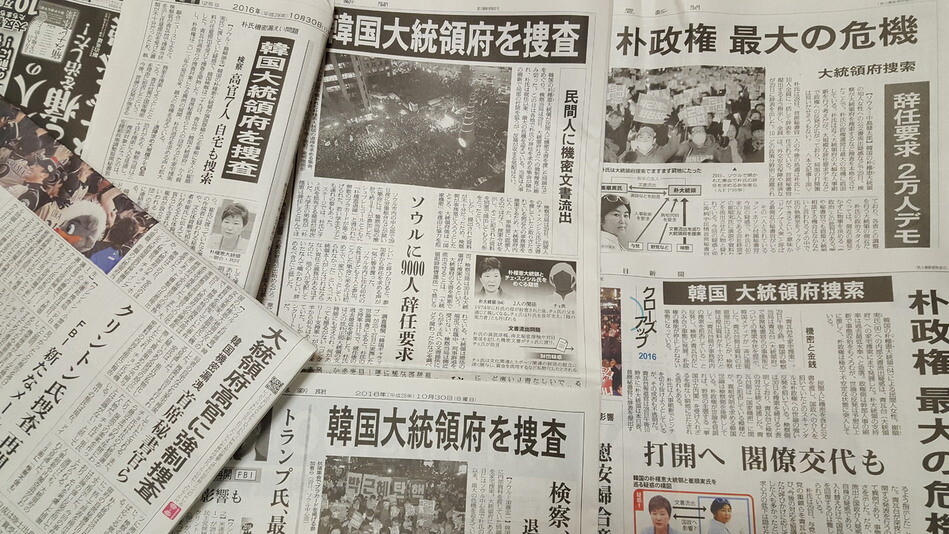hankyoreh
Links to other country sites 다른 나라 사이트 링크
China and Japan closely watching the ongoing Choi Sun-sil scandal

China and Japan are anxiously watching the unfolding Choi Sun-sil government interference scandal. How the situation is resolved is expected to have a significant impact on major foreign policy decisions by the Park Geun-hye administration, including the deployment of a Terminal High Altitude Area Defense (THAAD) missile defense system and Seoul and Tokyo’s agreement on Dec. 28 2015 over the comfort women issue.
China, which sees South Korea’s decision on THAAD deployment as a violation of its strategic interests, noted the potential for the Choi scandal to lead to its reversal. An Oct. 29 article in the Chinese Communist Party‘s newspaper People’s Daily asked, “Will the Park Geun-hye administration’s regional security policies be maintained if Park, who has consistently favored the THAAD deployment, faces an unprecedented political crisis? Will there be no change?”
The newspaper went on to hint at issues with the legitimacy of the Park administration’s THAAD deployment decision.
“The South Korean public cannot even confirm whether the THAAD deployment was Park Geun-hye’s own decision,” it said.
Lu Yin, an associate researcher at the Institute of Strategic Studies at China’s National Defense University, predicted “little likelihood of policies being changed in the short term, but subsequent South Korean administrations will face something of an obstacle on this issue [the THAAD deployment] in the medium to long term.”
Online media reported the news under the provocative title “Park Geun-hye falls prey to unholy religion.”
“Since 2016, Park Geun-hye has adopted foreign policies that have plunged South Korea into dire straits,” the article said.
“By this point, there is a possibility that these senseless policies were not at all the subjective determinations of Park Geun-hye, but something forced on Park Geun-hye by a behind-the-scenes manipulator yielding to the lure of huge profits,” it continued.
The mood was similarly urgent in Japan, which had seen its relations with South Korea as being on an upswing since the Dec. 28 comfort women agreement.
Tokyo is currently planning to renew its persistent demands for a bilateral General Security of Military Information Agreement (GSOMIA) with Seoul when Park arrives to attend a trilateral summit with China in December. Perhaps as a reflection of this, Foreign Minister Fumio Kishida told reporters in Hiroshima on Oct. 30 that the three sides “face a great responsibility to the international community and regional stability” with the summit, which was planned for Tokyo before the end of 2016.
“It‘s very important for the leaders to meet in person and discuss things constructively,” Kishida added. “As chair country, we will work to organize it.”
At a regular press conference on Oct. 31, Chief Cabinet Secretary Yoshihide Suga said the Japanese government would “refrain from commenting on matters related to internal affairs” - namely, the Choi scandal.
But on the matter of a trilateral summit, he said Tokyo would “continue preparing as scheduled, as we do not believe it will be affected.”
By Gil Yun-hyung, Tokyo correspondent
Please direct questions or comments to [english@hani.co.kr]

Editorial・opinion
![[Column] Season 2 of special prosecutor probe may be coming to Korea soon [Column] Season 2 of special prosecutor probe may be coming to Korea soon](https://flexible.img.hani.co.kr/flexible/normal/500/300/imgdb/original/2024/0426/3317141030699447.jpg) [Column] Season 2 of special prosecutor probe may be coming to Korea soon
[Column] Season 2 of special prosecutor probe may be coming to Korea soon![[Column] Park Geun-hye déjà vu in Yoon Suk-yeol [Column] Park Geun-hye déjà vu in Yoon Suk-yeol](https://flexible.img.hani.co.kr/flexible/normal/500/300/imgdb/original/2024/0424/651713945113788.jpg) [Column] Park Geun-hye déjà vu in Yoon Suk-yeol
[Column] Park Geun-hye déjà vu in Yoon Suk-yeol- [Editorial] New weight of N. Korea’s nuclear threats makes dialogue all the more urgent
- [Guest essay] The real reason Korea’s new right wants to dub Rhee a founding father
- [Column] ‘Choson’: Is it time we start referring to N. Korea in its own terms?
- [Editorial] Japan’s rewriting of history with Korea has gone too far
- [Column] The president’s questionable capacity for dialogue
- [Column] Are chaebol firms just pizza pies for families to divvy up as they please?
- [Column] Has Korea, too, crossed the Rubicon on China?
- [Correspondent’s column] In Japan’s alliance with US, echoes of its past alliances with UK
Most viewed articles
- 1[Column] Season 2 of special prosecutor probe may be coming to Korea soon
- 2No good, very bad game for Korea puts it out of Olympics for first time since 1988
- 3‘We must say no’: Seoul defense chief on Korean, USFK involvement in hypothetical Taiwan crisis
- 4Korea’s 1.3% growth in Q1 signals ‘textbook’ return to growth, says government
- 5Division commander ordered troops to enter raging flood waters before Marine died, survivor says
- 6Is N. Korea threatening to test nukes in response to possible new US-led sanctions body?
- 7Is Japan about to snatch control of Line messenger from Korea’s Naver?
- 8[Editorial] In the year since the Sewol, our national community has drowned
- 9[Editorial] 10 years on, lessons of Sewol tragedy must never be forgotten
- 10[Editorial] New weight of N. Korea’s nuclear threats makes dialogue all the more urgent